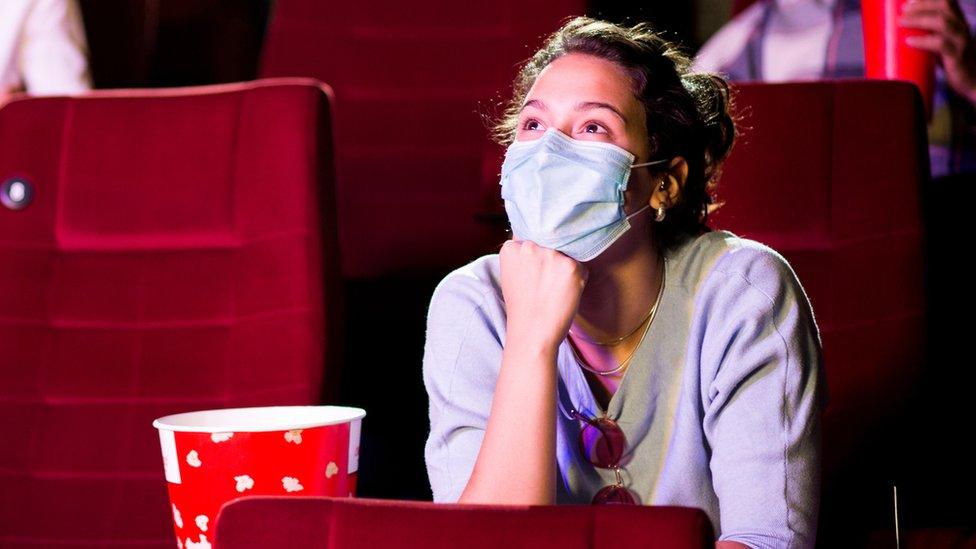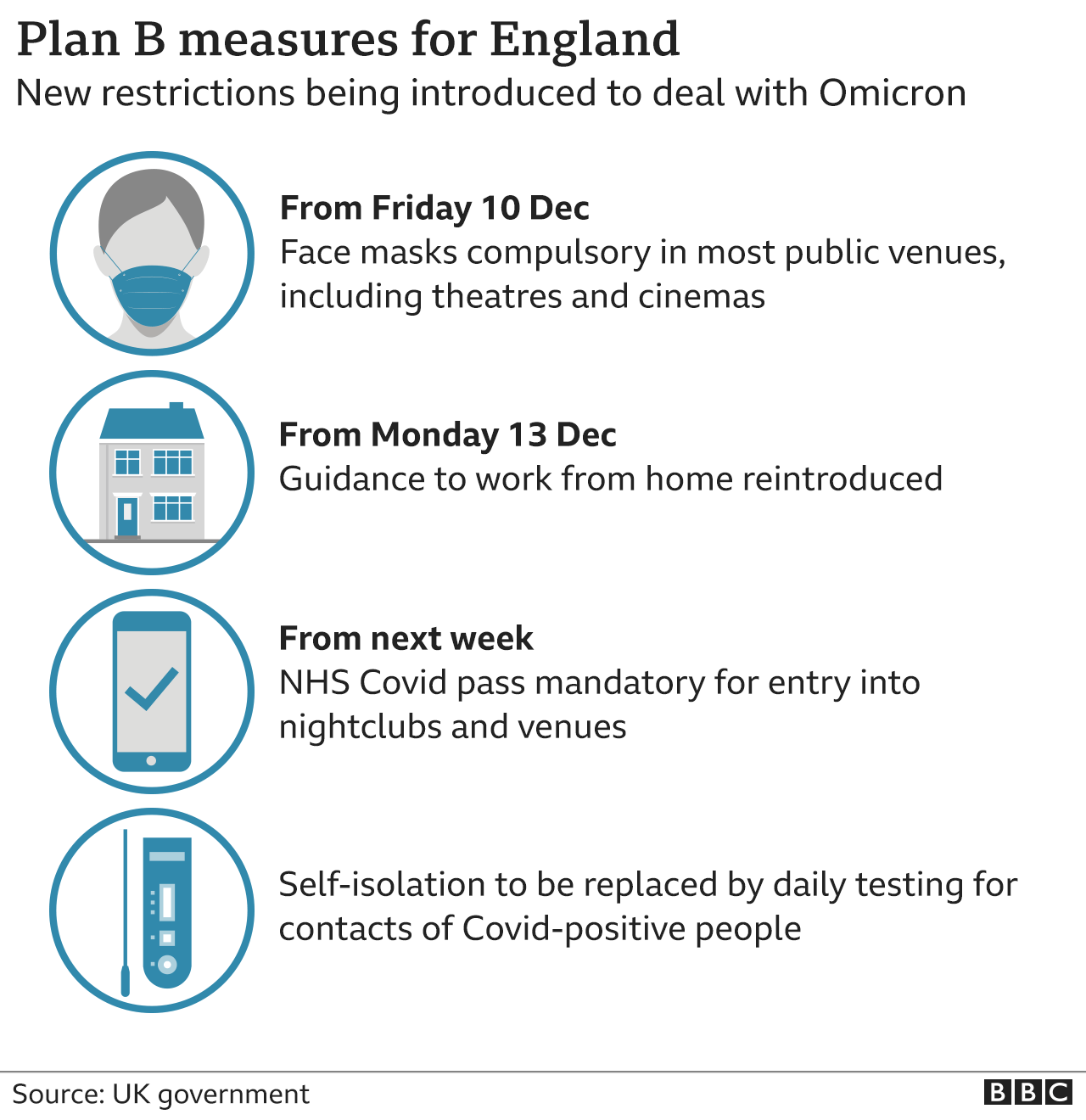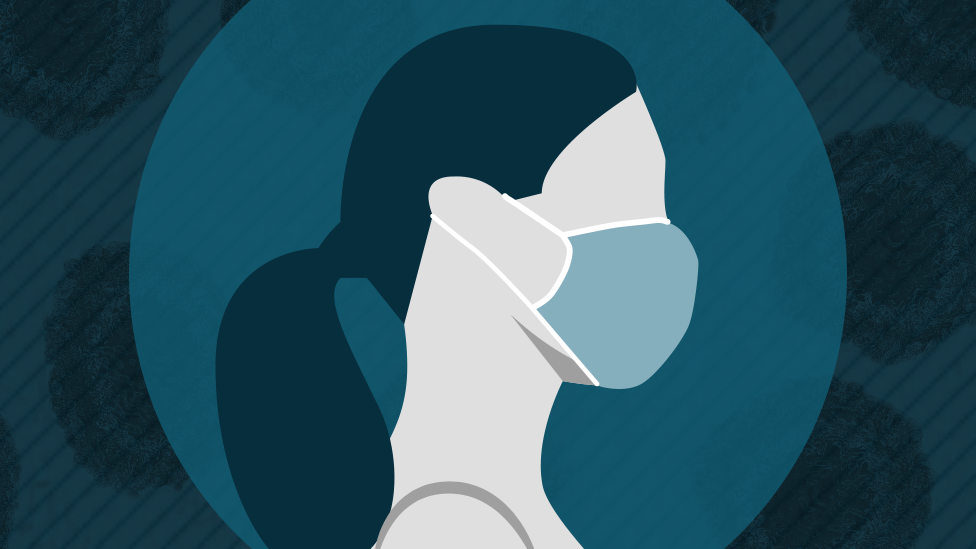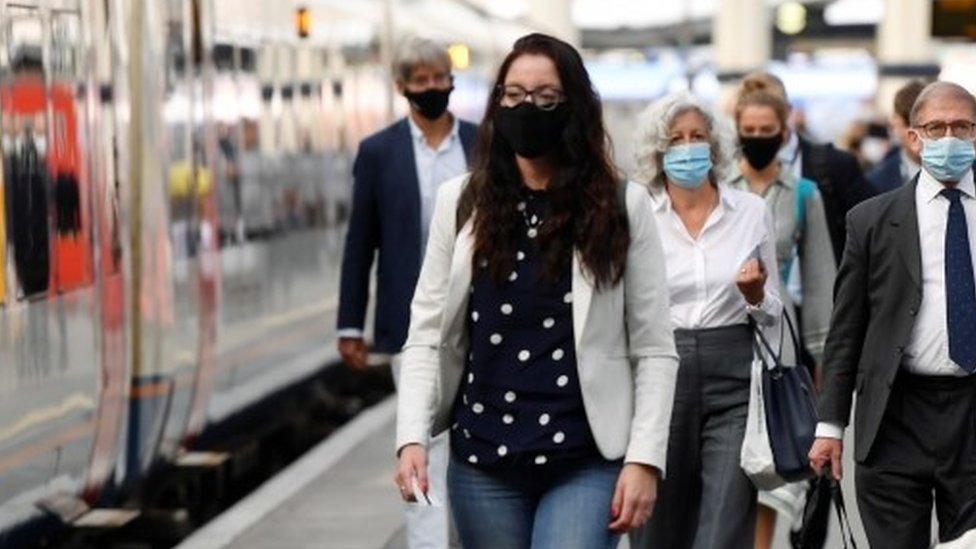Covid-19: Face masks required in more indoor venues in England
- Published
- comments

Face coverings are now compulsory in most indoor venues in England, under measures to tackle the Omicron variant.
The new rules require people to wear masks in locations including theatres, cinemas, places of worship, museums and indoor sport stadiums.
Further changes start next week under the government's move to so-called Plan B Covid restrictions.
It comes as another 448 cases of Omicron have been confirmed in the UK, taking the total number to 1,265.
On Friday, Downing Street said there were "no plans to go beyond where we are" but it would "act if necessary".
Asked about reports of a "Plan C" being drawn up, the prime minister's spokesman said there was "no document" he was aware of outlining such measures.
It comes as businesses have expressed concerns about the impact of the Covid passes and work from home guidance that begins next week.
Minister for small usiness Paul Scully said new restrictions were "undoubtedly difficult for businesses" but the government was "trying to get the balance right" by not shutting down the economy and instead bringing in "proportionate measures".
He added that recovery loans and grants were still available for businesses which were struggling.
Labour has said it will back the plans, allowing them to pass in the Commons.
However, shadow health secretary Wes Streeting said there were other measures the government should take, including administering 500,000 booster jabs a day, improving ventilation in schools and increasing statutory sick pay.
The total number of Covid cases reported in the UK on Friday was 58,194 - the highest number of cases since 9 January. Another 120 deaths within 28 days of a positive test were also recorded.

How well do face masks protect?

With a new, highly-contagious variant around, many countries are stepping up measures to try to stop its spread.
In the UK, face coverings should be worn in most indoor crowded places. But what difference do they make?
Worn correctly, a simple cloth mask can trap big and smaller spit droplets that come out of your mouth and nose when you breathe, cough and sneeze.
They are not perfect, but work well enough to substantially lower the risk to the people around you, should you be carrying coronavirus but are unaware.
If everyone wears a face covering, the protection is increased. Face coverings also give the wearer some protection from other people's coughs and sneezes. But you should make sure you keep your mask clean and dry so that it is up to the job.
According to one study, external, fabric masks block at least 63% of fine particles. A surgical mask stops around 78%. Specially-designed respirator masks - the ones worn by doctors working in intensive care - block 99.6%.
Face shields and masks with exhalation valves do not work as well because the virus spreads through aerosols and droplets that stay in the air.

Meanwhile, there is opposition from some Tory backbenchers ahead of a vote on the controls in the Commons next week.
Former cabinet minister Andrew Mitchell told the BBC the mood in the party was "sulphurous", following rows over the measures and revelations that parties were held inside Downing Street last winter.
Speaking on Thursday, Health Secretary Sajid Javid said the new rules will buy time against the Omicron variant amid a "credible risk" of a crisis in the NHS.
Mr Javid said the evidence was that Omicron was doubling every 2.5 or three days, which could mean a million infections by the end of the month as it takes over from the Delta variant in the UK.
Other nations of the UK - which are in charge of their own Covid rules - have already brought in stricter restrictions similar to Plan B.
The requirement to wear a face covering was reintroduced in shops and on public transport at the end of November, as a response to the emergence of the Omicron variant.
However, they are not compulsory in hospitality venues such as pubs and restaurants, nor in places where it is "not practical to wear them", like gyms.

The updated rules, external mean the public, and staff in public facing areas, will also now be required to wear face coverings in community centres, members clubs, libraries, bingo halls, snooker, halls, casinos, skating rinks and bowling alleys.
Similar rules on masks in indoor settings have already been introduced in other parts of the UK.
Under the other changes for England:
From Monday, people will be asked to work from home where possible
From Wednesday, the NHS Covid Pass - proving vaccination status or a negative lateral flow test - will also be required for visitors to nightclubs, indoor unseated venues with more than 500 people, unseated outdoor venues with more than 4,000 people and any event with more than 10,000 people
People will be exempt from showing a Covid passport when attending religious worship, weddings and funerals.
But the Night Time Industries Association has said Covid passes could have a "devastating impact" in the "crucial" pre-Christmas period for clubs - while pubs and restaurants have warned they face a collapse in demand at their busiest time of year due to the work-from-home guidance.
Dame Rosemary Squire, joint chief executive of West End theatre operator Trafalgar Entertainment, welcomed the new rules on mask-wearing in venues as "further reassurance to customers, performers and venue staff" but suggested the restrictions could "amplify concern" for some customers.
Former Justice Secretary Robert Buckland said the government needed to be on a "mission to explain" the case for Covid passes ahead of the Commons vote.
"I hope between now and Tuesday we'd get a lot more information about Covid passports," Mr Buckland told the BBC's Newscast podcast.
He said he was broadly supportive of the move to Plan B in England, but Covid passports were "a bit more of a vexed question".
Downing Street defended certification as a means to "allow venues to stay open" that would otherwise close.


THE CHRISTMAS FOOD TRENDS YOU NEED: From vegan Wellingtons to deluxe macaroni cheese
WINTER WALKS: Join Reverend Kate Bottley as she walks over the ruins of Jervaulx Abbey

- Published16 March 2022

- Published1 July 2022

- Published9 December 2021
